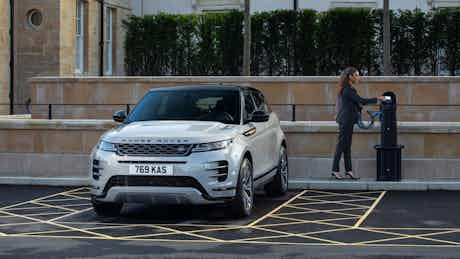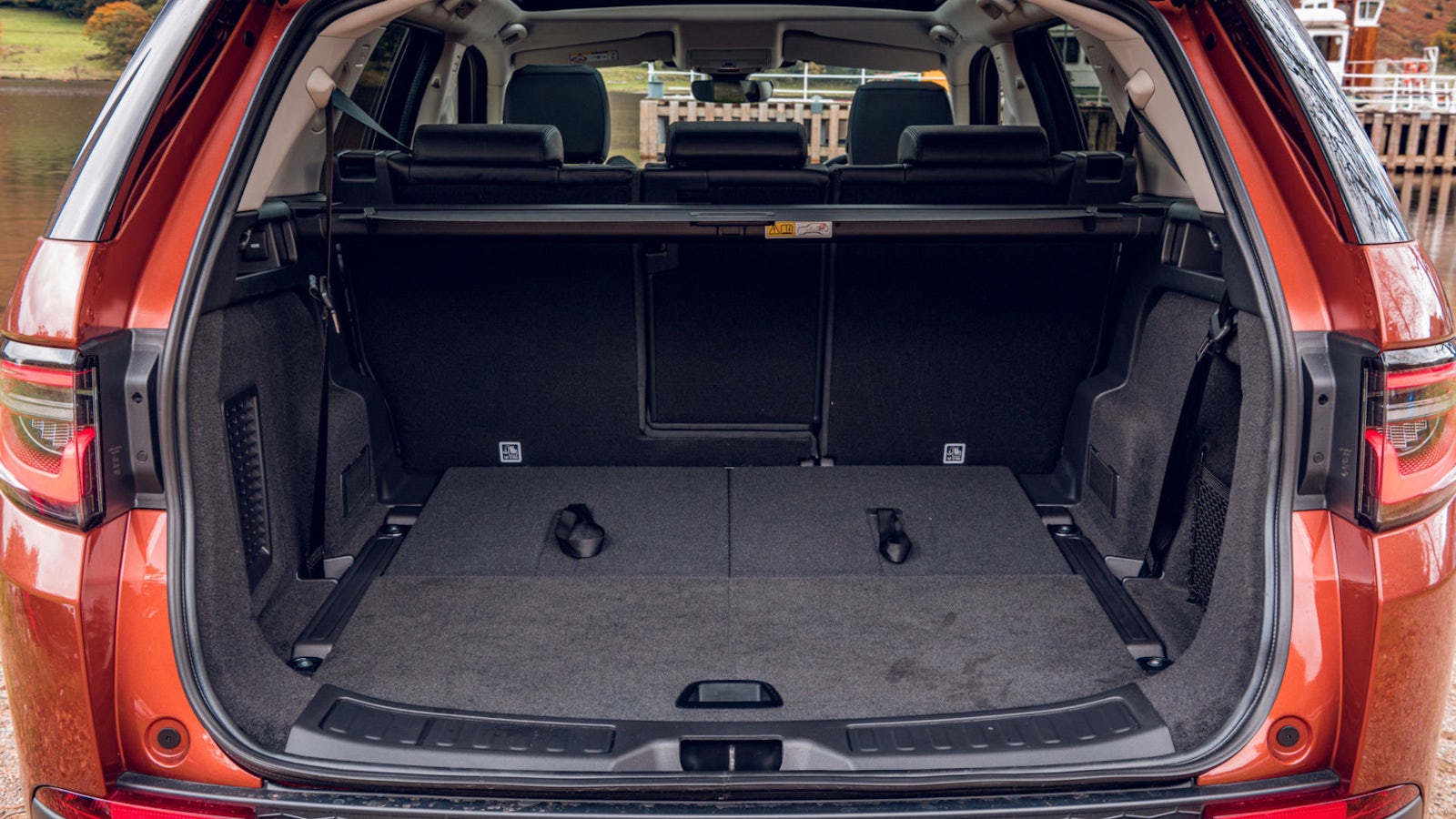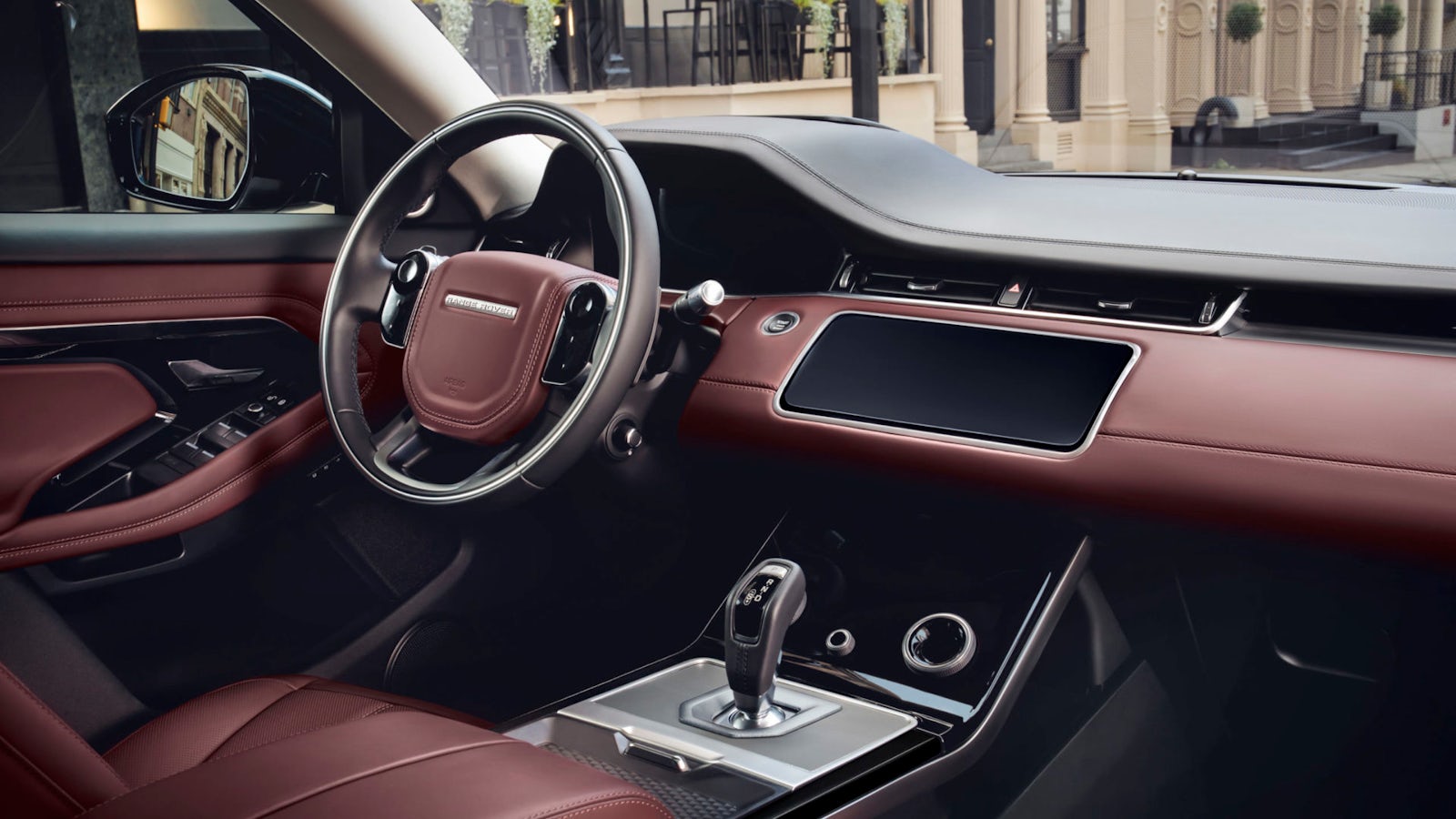Range Rover Evoque vs Land Rover Discovery Sport comparison
May 04, 2022 by Jamie Edkins

The Range Rover Evoque is an obvious choice for fashion-conscious buyers. Not only does it flaunt a prestigious badge and striking looks, but it has genuine substance to back up the promising first impressions.
But what if style isn’t the number one priority? There are plenty of more practical alternatives out there, and one of the best is the seven-seat Land Rover Discovery Sport. So which is the SUV to have?
This handy guide will walk you through all of the key differences between these two cars, and by the end you’ll know which is right for you.
Styling
| Range Rover Evoque vs Land Rover Discovery sport styling | ||||
| Car | Length | Width (inc’ door mirrors) | Height | Wheelbase |
| Range Rover Evoque | 4,371mm | 2,100mm | 1,649mm | 2,681mm |
| Land Rover Discovery Sport | 4,597mm | 2173mm | 1,727mm | 2,741mm |

While design will always be considered subjective, it would be hard to argue that the Range Rover Evoque isn’t one of the best looking small SUVs on the market. From the slim, swept-back headlights to the chunky wheel arches and the coupe-like silhouette, the Evoque offers undoubted presence in the metal. The proportions are neat and well-judged, yet with just enough of the chunky features that buyers in this class demand.

The Discovery Sport’s taller, longer body results in a slightly less extravagant appearance, but it’s still easy on the eye. Details such as the grille and headlights are similar to the Evoque, while elsewhere the more flamboyant features have been toned down somewhat to match the regular Discovery’s more practical intentions.
If it’s all-out style you’re after, the Range Rover Evoque is the obvious choice here. The Land Rover Discovery Sport is larger, and therefore more practical. So if that takes precedence over looks, this will be the way to go.
Space and practicality
| Range Rover Evoque vs Land Rover Discovery sport interior space | |||
| Car | Boot space | Rear legroom | Rear headroom |
| Range Rover Evoque | 591-litres | 864mm | 973mm |
| Land Rover Discovery Sport | 897-litres (5-seater) | 968mm | 984mm |

The exterior style of the Range Rover Evoque comes at the expense of cabin space. Those in the front won’t have any complaints, but the rakish roofline compromises rear headroom. At a pinch you could squeeze five in there. The boot is considerably smaller than the Discovery Sport’s as well, but at least there’s no load lip and it’s easy to load.

There’s plenty of room for passengers in the Discovery Sport’s second row. Equally, the bench can slide back and forth, which not only allows easier access to the sixth and seven seats in the back but gives any occupants a little extra space. Adults may start to grumble back there in longer journeys but overall the Discovery Sport is a fairly usable seven-seater. The boot is a lot bigger and more practical as well.
To sum up, the Range Rover Evoque makes a great small SUV for those who want form over function. If it’s interior space you’re after, and you need seven seats, then the Discovery Sport will be more suited.
Interior design
This sensible attitude of the Land Rover Discovery Sport is reflected in the interior design. It’s still a lovely place to sit, with plenty of leather and shiny trim around the place. It’s just a little bit more plain than the flamboyant Evoque. Technology is generous, with Apple CarPlay and Android Auto, climate control and a digital drivers display all available.

The Range Rover Evoque turns the luxury up a notch, which is no surprise seeing as it’s the more premium branded product here. There’s leather and solid metal over every visible surface, and it all feels very well screwed together. Technology is just as generous as the Discovery Sport, and the dual screen setup looks awesome as well.

If it’s all-out flair you want, just buy the Evoque. The cabin is a properly special place to sit, and it feels more premium as well.
Driving
Under the skin, the Evoque and the Discovery Sport ride on a near identical platform, though the Discovery’s is slightly longer overall. Confusingly, considering the name, it’s the Discovery Sport that’s set up for a more comfortable ride of the two.
By SUV standards, the Evoque delivers an entertaining drive. It isn’t quite a match for the Porsche Macan, but feels nimble and composed when cornering, yet never harsh over bumps. The steering is nicely-weighted and accurate, and body roll is kept neatly in check. Road and wind noise are suppressed inside the cabin too, so it’s a pleasant place to while away long journeys.
Out on the road, the Discovery Sport feels softer than the Evoque, and its extra height and length are noticeable. The balance it offers between a smooth ride, taut handling and hushed refinement places it towards the top of the class overall. Remember that it’ll do all this and go further off-road than any other rival, and what Land Rover has achieved with the Discovery Sport is remarkable.
If it’s off-road ability you want, the Discovery Sport is the better car. That said, the Evoque can still handle the rough stuff and it’s more fun to drive.
Engines
Both of these cars share similar engine options, with plenty of diesel options available. Both have an entry level diesel with 163hp, which can be paired with either a six-speed manual or an automatic gearbox. You can then upgrade to a 2.0-litre, 204hp diesel.

Both are also available with a 1.5-litre petrol plug-in hybrid. This will do 43 miles on a charge, while also returning a claimed 175mpg. It has 309hp, making it properly rapid.
You can also have a 2.0-litre petrol with 249hp in both cars, and the Evoque can be had with a 300hp petrol. You can’t really split these cars by the engines available, as they are more or less the same. Just go for the one which suits you best.
Value for money
The more premium badge on the boot of the Evoque means it’s rather expensive considering its size. It starts from £32,620, however you can save an average of $1,502 on an Evoque through carwow*.

By comparison, the Discovery Sport starts from £33,125, which isn’t a huge premium considering the additional space and practicality you get. You can save an average of £444 on one through carwow*.
Safety and reliability
Both of these cars scored the maximum five-stars in their latest Euro NCAP crash tests, so both will be safe enough for family life. It’s worth noting though that the Land Rover Discovery Sport hasn’t ben tested since 2014, and the regulations have become more stringent since then.
As for reliability, both of these cars come with a three-year unlimited-mileage warranty for added peace of mind. You can also extend this warranty beyond three years if you want.
Verdict
Sharing so much mechanically, it shouldn’t be a massive surprise to discover that this pair share many similar strengths and weaknesses. Both are great to drive, comfortable and refined, yet both suffer from a limited engine range.

In the end, the final decision comes down to one question – given the choice between practicality and luxury, which do you value more highly?

The Range Rover Evoque looks and feels the more special car – the cabin is as immaculately assembled as it is to look at and the exterior is truly eye-catching. The Discovery Sport, on the other hand, sacrifices just a little of the style in favour of much more cabin space and a generous boot.
Wearing our most sensible hats, we’d just lean towards the Discovery, but the Evoque remains a very tough car to fault.
Cars Change? Carwow!
Looking for a new set of wheels? With Carwow you can sell your car quickly and for a fair price – as well as find great offers on your next one. Whether you’re looking to buy a car brand new, are after something used or you want to explore car leasing options, Carwow is your one stop shop for new car deals.
















